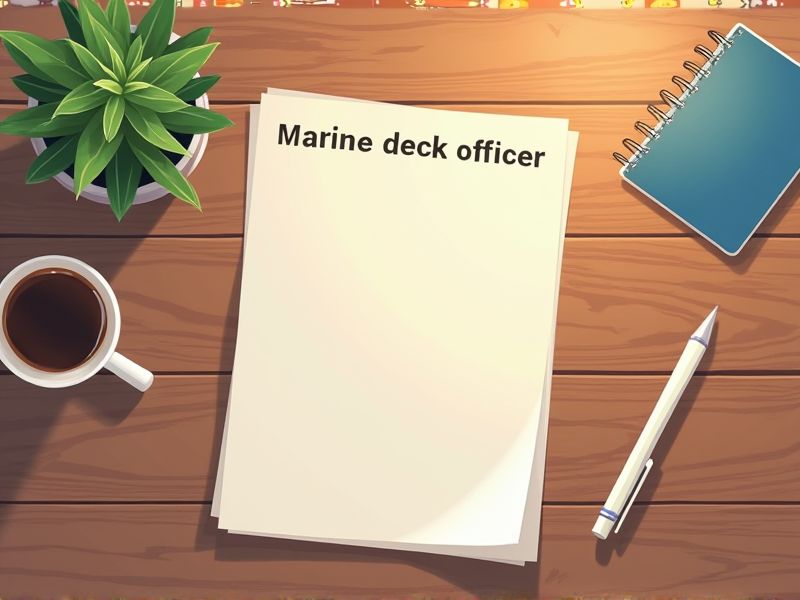
Marine deck officers have critical roles on ships, ensuring navigation, safety, and overall maritime operations. These responsibilities necessitate a deep understanding of international regulations, vessel management, and safety protocols. Certifications provide the necessary validation of skills and knowledge crucial for handling complex marine environments. Here are several important certifications you may need as a Marine deck officer.
STCW Basic Safety Training Certificate
The STCW Basic Safety Training Certificate ensures marine deck officers are equipped with essential safety knowledge, which reduces the likelihood of onboard incidents. International regulations require this certification for compliance, creating uniform safety standards across global maritime operations. Holding the certificate enhances a marine deck officer's employment prospects as employers prioritize candidates with verified safety qualifications. It prepares officers to effectively respond to emergencies, safeguarding both crew and vessel.
Advanced Fire Fighting Certificate
The Advanced Fire Fighting Certificate equips marine deck officers with critical skills to effectively manage fire emergencies on board, ensuring crew and vessel safety. This certification provides specialized training in fire prevention, control techniques, and emergency evacuation procedures, minimizing potential damage and loss. Maritime regulations require deck officers to be proficient in fire fighting to comply with international safety standards and avoid penalties. Possessing this certification enhances a deck officer's competency, increasing their employability and responsibility in maritime operations.
Proficiency in Survival Craft and Rescue Boats (PSCRB) Certificate
Proficiency in Survival Craft and Rescue Boats (PSCRB) Certificate is essential for a Marine deck officer to ensure they are adequately trained in emergency procedures. This certification demonstrates the officer's ability to operate and manage lifeboats and rescue boats effectively, which is crucial during maritime emergencies. A deck officer with a PSCRB certificate contributes to the overall safety protocol aboard a vessel, reducing risks for crew and passengers. International maritime regulations require trained personnel to handle survival crafts, making the certification mandatory for compliance and operational safety.
GMDSS General Operator Certificate (GOC)
The GMDSS General Operator Certificate (GOC) ensures that marine deck officers are proficient in operating modern communication and safety systems crucial for maritime operations. International regulations, such as those enforced by the International Maritime Organization (IMO), mandate that vessels have certified personnel to handle global maritime distress and safety systems. Holding a GOC enhances a marine deck officer's ability to efficiently manage distress signals, reducing risk during emergencies. This certification equips officers with up-to-date knowledge of global communication standards, ensuring maritime safety and compliance.
Officer in Charge of a Navigational Watch (OICNW) Certificate/Certificate of Competency (CoC)
The OICNW Certificate ensures a marine deck officer possesses the necessary skills and knowledge to navigate a vessel safely. Obtaining the CoC guarantees that the officer meets international standards set by the International Maritime Organization, fostering global consistency. Without this certification, a deck officer may lack the legal authority to manage navigational duties on commercial ships. The CoC acts as a benchmark, reinforcing both safety and compliance within maritime operations.
Bridge Resource Management (BRM) Certificate
A Bridge Resource Management (BRM) Certificate equips a marine deck officer with essential skills in communication, leadership, and teamwork to ensure safe navigation and efficient operations on the bridge. The International Maritime Organization (IMO) mandates BRM training for deck officers to minimize the risk of human error, which causes a significant percentage of maritime accidents. Deck officers with BRM certification demonstrate improved situational awareness and decision-making abilities, reducing the likelihood of collisions or groundings. Adopting a BRM approach promotes a culture of safety and efficiency, enhancing overall vessel performance and compliance with international maritime standards.
Radar and ARPA Certification
Marine deck officers require Radar and ARPA Certification because radar systems are crucial for navigation and collision avoidance. These certifications ensure that officers possess the necessary skills to interpret radar data and make informed decisions in diverse weather conditions. The training helps prevent maritime accidents by enabling officers to track and analyze moving objects effectively. Regulatory bodies mandate these certifications to maintain high standards of safety and competence at sea.
Ship Security Officer (SSO) Certificate
The need for a Ship Security Officer (SSO) Certificate stems from the International Ship and Port Facility Security (ISPS) Code, which mandates specific security requirements for ships. Without an SSO Certificate, a marine deck officer lacks the formal qualifications to adequately assess and manage security threats on board. Obtaining this certification ensures that the officer is equipped to implement and maintain the vessel's Ship Security Plan as per regulatory standards. Compliance with these standards is crucial for protecting the ship, crew, and cargo from potential security breaches.
Marine Environmental Awareness Certification
Marine Environmental Awareness Certification equips marine deck officers with critical knowledge about environmental protection, which enhances their compliance with international maritime regulations. This certification ensures officers understand the impact of maritime activities on marine ecosystems, promoting sustainable navigation practices. As regulations become stricter, certified officers are better prepared to avoid penalties related to environmental damage. Proper training reduces operational risks, safeguarding marine biodiversity and mitigating the effects of shipping on climate change.
Maritime Law and Regulations Certificate
Maritime Law and Regulations Certificate ensures marine deck officers understand international and national maritime laws, enhancing compliance with legal standards. It educates officers on safety protocols, reducing accidents and improving operational safety on vessels. The certificate provides knowledge on environmental protection regulations, aiding in the preservation of marine ecosystems. It also equips officers with skills to handle legal disputes or incidents efficiently, minimizing legal liabilities for shipping companies.
Summary
When you obtain additional certifications as a Marine deck officer, you enhance your professional qualifications, increasing employability and competitiveness. Employers are more likely to hire or promote individuals with advanced certifications, given their expertise and skills. This can lead to better career opportunities, including higher-ranked positions and increased salary potential. The certifications also contribute to improved onboard operations, as you apply specialized knowledge to ensure maritime safety and efficiency.
